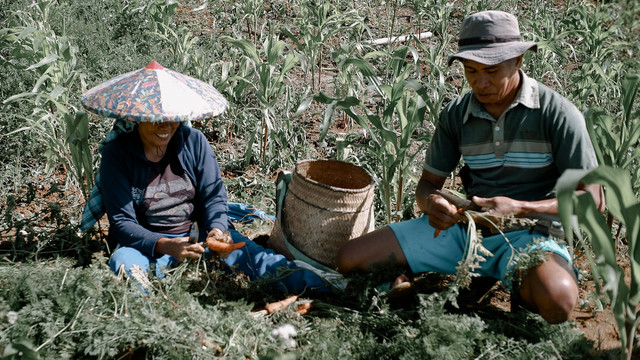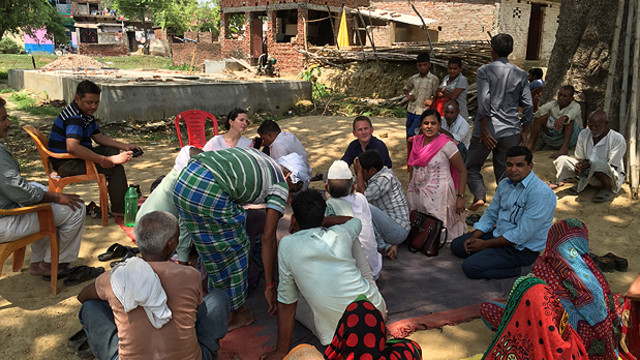It's the process, stupid
Social learning can be effective in tackling 'wicked' problems such as climate change. And research shows there are better results when strong processes are at the centre of these approaches.



A community workshop. Social learning processes were a key element of a successful 10-year collaboration between the International Potato Centre (CIP) and indigenous communities in the Peruvian Andes (Photo: IIED)
As climate change escalates and its impacts deepen, resources to support poor people to adapt are needed more than ever.
Proposed cuts to US foreign aid and broader criticism of overseas spending threaten funding for climate change initiatives in some of the world's most vulnerable countries.
Yet resources are only part of the bigger picture: the processes that help people use resources effectively are just as important.
Current processes often deliver short-term results – as part of fixed-term projects or to political timeframes. This can help meet immediate needs but is less useful for building systemic capacity to deal with longer-term issues or mobilise lasting change in behaviour.
Reworking the famous phrase from Bill Clinton's 1992 US presidential campaign, when it comes to adapting to climate change and addressing other so-called 'wicked' problems impacting some of the world's poorest, "it's the process, stupid".
Why social learning works
Social learning approaches may be one solution. With flexible, multi-stakeholder processes at their core, they aim to catalyse collective cycles of learning and action around common problems.
They can strengthen relationships between key stakeholders, enabling a quick response to changing evidence or contexts. This leads to solutions that are more appropriate and sustainable. They can also help bring together short-term and longer-term priorities, especially when the learning and action cycles continue beyond traditional four or five-year projects.
Typically, social learning approaches have helped solve natural resource management issues, for instance by working out ways to share scarce water resources across groups of farmers.
But an emerging body of evidence shows this kind of approach can be effective in solving other complex problems, including those arising from climate change and food insecurity.
The importance of process
IIED has recently piloted the Climate Change and Social Learning (CCSL) framework, tracking factors that help foster social learning in a more systematic way.
The framework helps users track process and outcomes in four key aspects of a social learning approach: engagement, iterative learning, building capacity, and challenging institutions.
With funding and support from CGIAR's Climate Change Agriculture and Food Security programme (CCAFS), we tested this framework with five different initiatives operating at different scales. These were:
- The 'Potato Park' in the Peruvian Andes
- The 'Bolsa Floresta Programme' in the Brazilian Amazon
- The African Climate Change Resilience Alliance (ACCRA) in Uganda
- The Policy Action for Climate Change Adaptation (PACCA) in East Africa, and
- The Collaborative Adaptation Research Initiative for Africa and Asia (CARIAA)
Our findings confirm the theory: that social learning-orientated approaches with strong process leads to collective learning and positive change; and where the four key themes interlink, the results were stronger still. Conversely, outcomes were weak where there is little or no process.
Initiatives that have been running longer than others show clearer results. Over 10 years, multiple cycles of learning and action at the Potato Park have built mutual understanding and capacity, and challenged institutional ways of working.
The results speak for themselves: repatriation of 410 native potato varieties to Potato Park communities – the first such repatriation from a gene bank to communities.
Challenge drives change
Given that powerful institutions tend to control resources, structures, and decision making, we wanted to test whether challenging these institutions would lead to change.
Too often stakeholders at higher levels are unwilling to devolve decision-making powers, making it hard for inclusive learning and action processes to progress. Meanwhile, institutional silos and hierarchies further stifle these processes.
Power, politics, and decision making should be front and centre if flexible, process-based problem solving is to be effective.
We saw the five initiatives challenge institutions in different ways. ACCRA, PACCA, and the Potato Park all integrated members of institutions they wished to challenge into their initiatives – engaging them, developing their capacity, and including them in iterative learning cycles.
This led to stakeholders understanding the merits of the processes used. We saw institutional barriers broken down and opportunities for collective learning open up. And, most importantly, we saw a real willingness to test out new approaches.
Moving forward
Despite the small sample size, these findings on how social learning approaches can help solve complex challenges and improve development outcomes are highly encouraging.
At the same time, we have been looking specifically at how social learning might help address the challenges associated with the uncertainties of future climate change. Three case studies from Uganda, India and Kenya found that processes within social learning can help communities manage some of these uncertainties and so better adapt to climate change.
To work for the poorest, adopting flexible process-oriented approaches needs to be more than a technocratic exercise. Powerful institutions, such as government and donors must be willing to change.
Planning and funding cycles need to be more flexible and decision-making must empower rather than undermine the iterative reflect-and-act cycles inherent in process-oriented approaches like social learning. Achieving this is not easy, but our examples show 'critical friends' and trusted intermediaries who bring together stakeholders and work with institutions to challenge existing norms can be one effective way of changing mindsets.
We think social learning approaches show promise for bringing together long-term and short-term priorities, building understanding and consensus between diverse stakeholders on difficult issues, and creating buy-in for change.
Future work should continue building evidence and understanding on how using flexible process-oriented approaches such as social learning can mobilise action while improving outcomes. One way of doing this is by working with those willing to experiment.
Ben Garside (ben.garside@iied.org) is senior researcher in IIED's Shaping Sustainable Markets research group. Marissa Van Epp is a consultant working for IIED.



